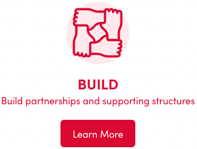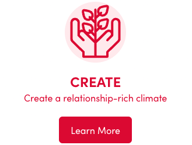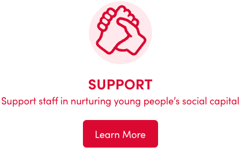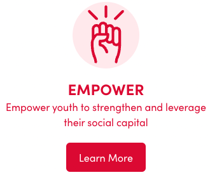Schools and organizations that serve young people are critical environments for supporting their healthy growth and development. One opportunity organizations have is to promote social capital, the resources and supports that help young people define and pursue their life goals.
Rooted in a web of supportive relationships, social capital becomes critically important in middle school and through high school and young adulthood, as they prepare to work towards their postsecondary goals.
Search Institute’s Social Capital Framework is based on research-backed principles that have been shown to support young people’s social capital development. Applying this framework can help organizations learn ways to strengthen social capital and maximize the opportunity to become a social capital promoting organization.
What Is Social Capital?
Search Institute defines social capital as the resources that arise from a web of relationships, which young people can access and mobilize as they pursue their life goals.
More simply, it’s the web of support that young people have in their lives— the relationships, connections, opportunities, and resources that can help young people as they work toward their education, career, or life goals.
Becoming a Social Capital Promoting Organization
Search Institute’s decades of research and practice have taught us that developmental relationships are key for young people’s positive development. Social capital is a way of focusing on not just the one-to-one relationships with individuals, but the web of relationships that surround young people.
A social capital promoting organization is a school or youth-serving organization that is committed and intentional about infusing meaningful relationships that provide resources and opportunities throughout the entire organization and beyond in an effort to support young people’s social capital development.
A Framework for Understanding Social Capital
We developed the Social Capital Framework as a way to give schools and youth-serving organizations actionable and practical strategies that can be implemented within their organization on their path toward becoming a social capital promoting organization.
The framework is informed by our research, which has identified the core conditions that are needed within youth-serving organizations in order to effectively and equitably contribute to young people’s social capital growth.
The Social Capital Framework is designed to help leaders and practitioners think about ways to enhance or be more intentional about things they are already doing to increase opportunities for all young people.
The framework is divided into 4 domains: Build, Create, Support, and Empower.
BUILD..
CREATE..
SUPPORT..
EMPOWER..
Taking a Pulse: Assessing your ability to be social capital promoting organization
Search Institute has partnered with schools and youth-serving organizations to better understand how their goals and work can translate into social capital and help support positive youth outcomes.
Whether you are working toward youth academic and education success, career and workforce readiness, social emotional learning, youth voice and agency, social capital can be integrated into the fabric of your organization.
How is your organization supporting social capital today? Are there areas of opportunity to explore?
The Youth Opportunity Checkup is a tool designed to support organizations in self-assessing the four core areas of a social capital promoting organization.
A tool to help you generate conversations, benchmark the progress, identify gaps and identify and Inform ongoing efforts to close gaps and achieve the organization's social capital goals.







